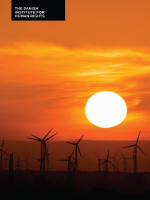
Women’s human rights in the energy transition in Sub-Saharan Africa; Roundtable event outcome report and background scoping paper
While Sub-Saharan Africa has the lowest energy access rates in the world, the development of renewable energy in Africa has been increasing over the last decade, with many countries in the region working to increase renewable energy capacity in recent years. Frequently, the development of and transition to renewable energy is positioned by various stakeholders as ‘inherently good’ due to the potential contribution of the green transition to mitigating climate change and enhancing energy access. Taking a closer look at energy transition dynamics in Sub-Saharan Africa, however, it becomes evident that the full range of actual and potential human rights impacts are at play.
Furthermore, while it has been noted that women and girls frequently bear a disproportionate burden of the adverse impacts associated with energy projects and are less likely to share in the benefits, this acknowledgment has not translated into consistent gender responsiveness in the development and implementation of such projects.
On 6 October 2021 the Danish Institute for Human Rights (DIHR) hosted a virtual roundtable on the rights of women and girls in the energy transition in Sub-Saharan Africa. The purpose was to map out key gender issues, questions, impacts, challenges, opportunities and ways forward to ensure that renewable energy development fully integrates respect for the rights of women and girls. The meeting gathered 20+ practitioners and experts from the Sub-Saharan African region as well as globally, representing the renewable energy sector, public institutions, civil society organisations and subject matter experts.
This summary report captures the highlights of the discussion with a view to contribute to further dialogue and action to embed gender-responsive approaches in renewable energy development in the region. In addition, a background paper was prepared in advance of the roundtable to provide an introduction to some of the issues discussed during the roundtable meeting.
We strive to make the pdf versions of our publications etc. accessible for screen readers. If you experience any problems, please contact Digital Editor Stine Juhl Nielsen on stni@humanrights.dk
